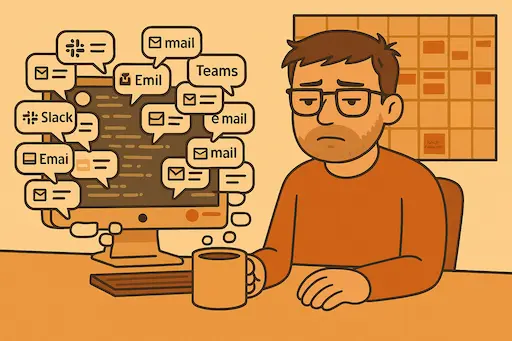
Every ping wants a piece of you. Eventually, there’s nothing left to share.
By the time I finished my fifth meeting of the day, I’d spent five and a half hours “collaborating” and exactly zero minutes doing what I was hired to do. I’m a developer, technically. But most days I feel more like an antenna picking up whatever signal Teams, or Jira or Outlook decides to emit.
The meetings are just the visible part of it. There are other distractions. These come in smaller doses: the quick question from a colleague, the tiny follow-ups, the just-checking-ins from the manager who’s role seems only to check in. Individually they’re harmless; together they grind your focus down to dust. You end the day mentally fried and strangely guilty, like you should’ve been able to push through it.
Somewhere along the line, we decided attention was infinitely divisible. That we could hop between contexts and still call it productivity. But the brain doesn’t work like that. Every interruption tears a hole in your mental state. Switching tasks means leaving part of your mind behind to clean up the mess. It’s like recompiling a giant codebase every time someone says your name. You can do it; but don’t pretend it’s free.
Our process is loosely Scrum, in the way that instant noodles are loosely cuisine. Everyone’s invited to everything. Decisions mean meetings. Meetings end when the clock says so, not when the problem’s solved. Retros have become therapy sessions about “learnings” and “wins” while the real issues quietly get ignored. Meetings get booked a week out, which is basically permission to stop doing anything until then. We wait, we discuss, we run out of time. We call it agile, but nothing gets delivered.
Outside the calendar, the noise keeps humming. Teams, email, the percussion section of modern work. Each ping is a tiny jolt, another request to reload your brain. Async tools have turned into live chat with better branding. You can’t find flow when your environment’s designed to keep you half-distracted. The cost isn’t easily measured in minutes, it’s in energy. What gets stolen isn’t just time, it’s continuity. Every interruption resets your mental state. Every switch restarts the build. You lose hours not because of the interruptions themselves, but because of how long it takes to recover from them. That’s why you can finish a full day with nothing tangible to show for it and still feel wrecked. It’s not burnout exactly. It’s erosion. Attention worn thin by constant context loss. The overall effect feels the same when you’re in it.
Developers talk about flow like monks talk about enlightenment. That state when code, thought, and time merge. I used to live there. Now it’s a brief holiday between meetings. For a developer flow shouldn’t be rare but it is because our systems reward availability over depth. Visibility over progress. The result is a quiet, shared exhaustion that everyone feels but nobody names. We have mistaken the visibility of meetings and process output for progress but the real value is in delivering a working product to the customer.
Sometimes I just need to remember the world wont collapse if teams “accidentally” crashes and I don’t notice. The silence feels like oxygen. Sometimes the most productive thing you can do is to make yourself a little bit unreachable.
None of this is a bug. Teams don’t fill their calendars with noise by accident. They do it when trust is missing, when decisions are fuzzy, when talking feels safer than acting. But that’s a story for another day. For now, I’ll take my hour of quiet and try to remember what real work feels like.